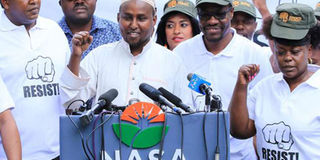Why opposition Nasa is bound to fail in its quest to split Kenya

Suna East MP Junet Mohamed, accompanied by other National Resistance Movement members, addresses a press conference at their Okoa Kenya offices in Nairobi on November 3, 2017. Has Nasa seriously evaluated the implications of secession and what it means for the country’s political stability? PHOTO | JEFF ANGOTE | NATION MEDIA GROUP
What you need to know:
- Secession is not always a viable way of addressing grievances between regions and groups and the state.
- In pursuing this path, Nasa is set to join the league of failed secessionist movements in Africa.
After losing the last elections, the National Super Alliance has reignited the secession debate by proposing the creation of the so-called People’s Republic of Kenya.
The Nasa leadership says communities that feel politically and economically excluded by successive regimes since independence have a right to secede.
But is the opposition serious in its quest for secession or is this just a ploy to rally its increasingly disillusioned support base in the wake of a humiliating electoral defeat?
Has Nasa seriously evaluated the implications of secession and what it means for the country’s political stability?
Can the coalition translate its secessionist rhetoric and sentiment into an active insurgency or an effective campaign for international recognition?
TREASON
To secede means to break away from a state to create a new one.
Secession is always a complex affair triggered by myriad factors, including cultural differences, ethnic oppression and inequitable access to resources.
A cursory look at secessionist movements around the world reveals that attempts to break up nations almost always end up in failure.
First, states treat secession as a treasonable act and often use violent means to quell such insurgencies and to deter such activities in future.
Second, the international community tends to resist attempts to dismember states.
A good example is the European Union’s rebuffing of attempts by Catalonia to secede from Spain.
No wonder the low success rate for secessionist movements, even in Africa.
POLITICAL STABILITY
With the exception of South Sudan and Eritrea, secessionist movements in Africa have invariably failed for a number of reasons.
Since the creation of the Organisation of African Unity in 1963, the precursor to the African Union, countries on the continent have tended to treat such movements as a threat to domestic and regional political stability.
On this issue, they have occasionally won international backing as was the case in Congo in the early sixties when the United Nations helped quell the secessionist movement in Katanga province.
STATUS QUO
In attempting to understand why, in spite of this constantly lurking menace, African states have always repulsed threats to their territorial integrity, the Brenthurst Foundation cited institutional factors at regional and international levels.
“Part of the explanation is historical, a by-product of Africa’s decolonisation and the values instilled in the continent’s founding political structures, namely, the Organisation of African Unity.
"Other reasons relate to the international community’s predilection for the status quo.”
Besides domestic and international resistance, secessionists have also had to reckon with the sheer military might of states.
When Biafra sought to break away from Nigeria in 1966, Col Yakubu Gowon declared the secession illegal and refused to accept the region’s sovereignty.
He deployed 100,000 troops to quell the insurgency. Vanquished, Biafra was finally reintegrated into Nigeria.
MILITARY
When the Northern Frontier District of Kenya attempted to secede shortly after independence to be part of what was then known as Greater Somalia, Mzee Jomo Kenyatta’s government responded with ruthless military force, ending the Shifta insurgency in 1967.
Some attempts to secede have come at a massive economic cost.
At its height, the Movement for the Emancipation of the Niger Delta resorted to economic sabotage, blowing up pipelines and kidnapping workers in the oil-rich Niger Delta and in the process dealing a severe blow to Nigeria’s economy.
These are just a few examples illustrating the point that secession is not always a viable way of addressing grievances between regions and groups and the state.
DIALOGUE
Addressing the real issues facing regions and communities that feel excluded yields better results.
Devolution is a better path to political and economic empowerment than stoking ethnic emotions around real and perceived grievances.
With the Jubilee government saying it will not broach any attempts to dismember the country, and the international community rooting for dialogue, the opposition faces a daunting task in prosecuting its secessionist agenda.
In pursuing this path, Nasa is set to join the league of failed secessionist movements in Africa.
The tragedy however lies in the fact that Nasa can go to the extent of giving false hopes of a better future to millions of Kenyans on the premise of such a doomed enterprise.
Mr Choto is a lawyer and public affairs analyst





